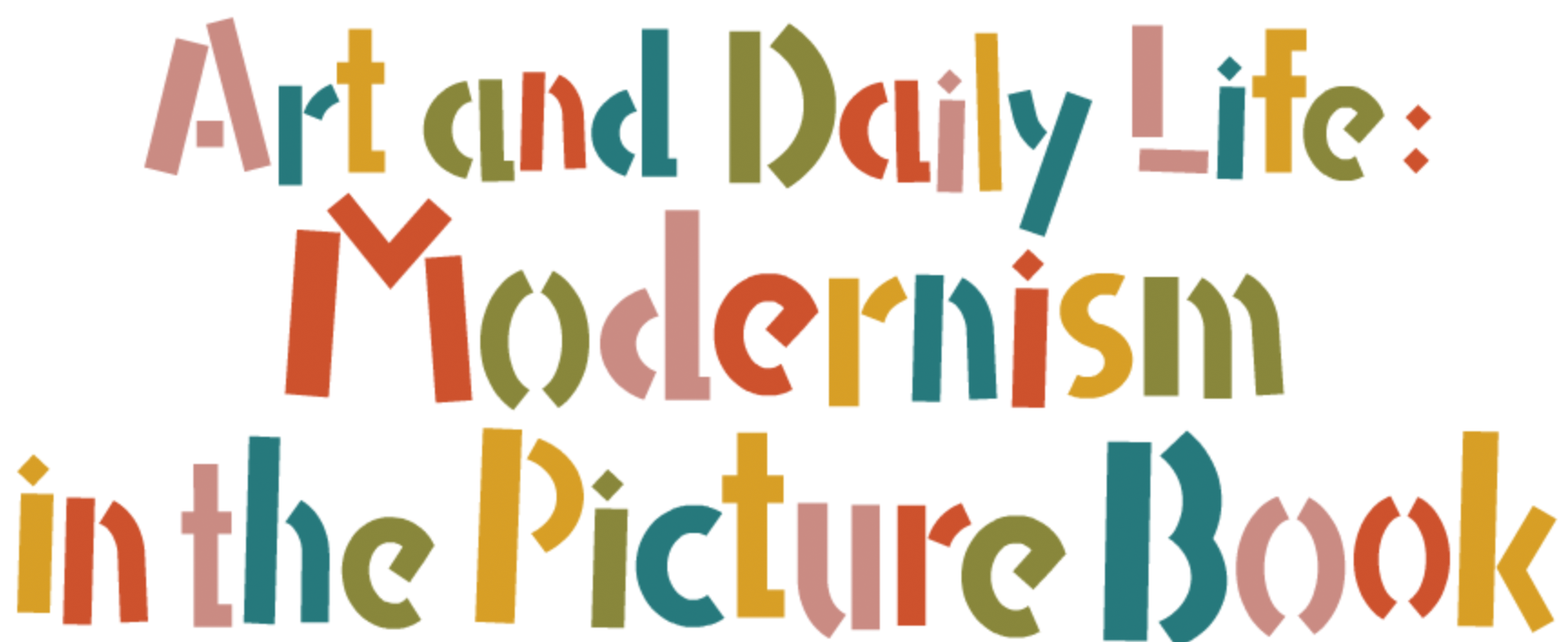本文
Bibliography
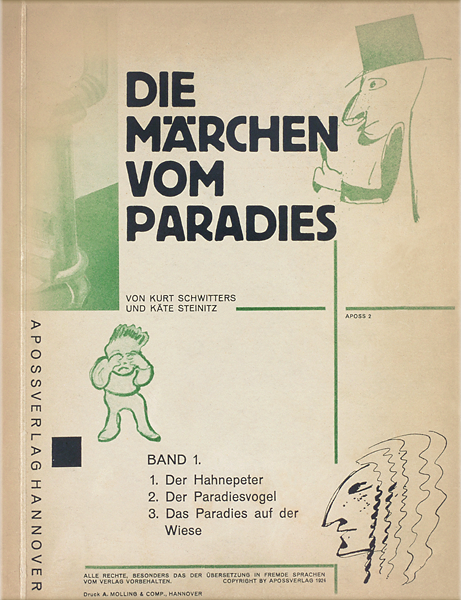
Stories of Paradise
Die Märchen Vom Paradies
Apossverlag; Hannover.
1924,
32 pages.
273x210 mm.
Reproduced by permission of The Steintz Family Art Collection. www.katesteinitz.com
We thank The Steiniz Family Art Collection for giving parmission to use Stories of Paradise.
1/25
Stories of Paradise

2/25 Push an image to enlarge
Stories of Paradise. by Kurt Schwitters and Kate Steinitz. (♪)
Stories of Paradise
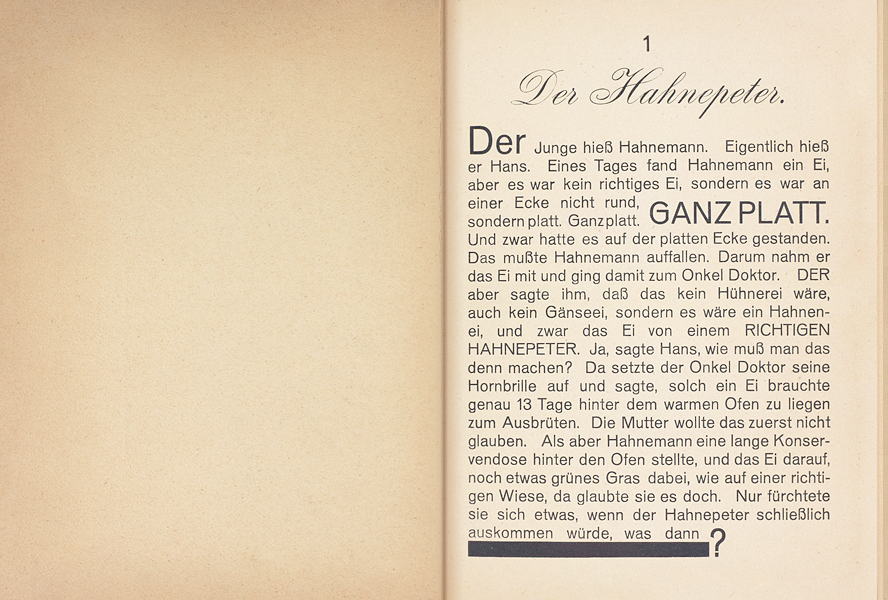
3/25 Push an image to enlarge
Hahnepeter. One day, Hahnemann found an egg. But it was not an ordinary egg. On one end it was not round but flat. He found it standing on its completely flattened bottom. Uncle said, “This is neither a hen’s egg nor a goose’s, but the egg of a cock, it’s a genuine Hahnepeter. To hatch, such an egg should be put behind a warm stove for thirteen days.” Mother was a bit worried thinking what to do if the Hahnepeter really did hatch.
Stories of Paradise
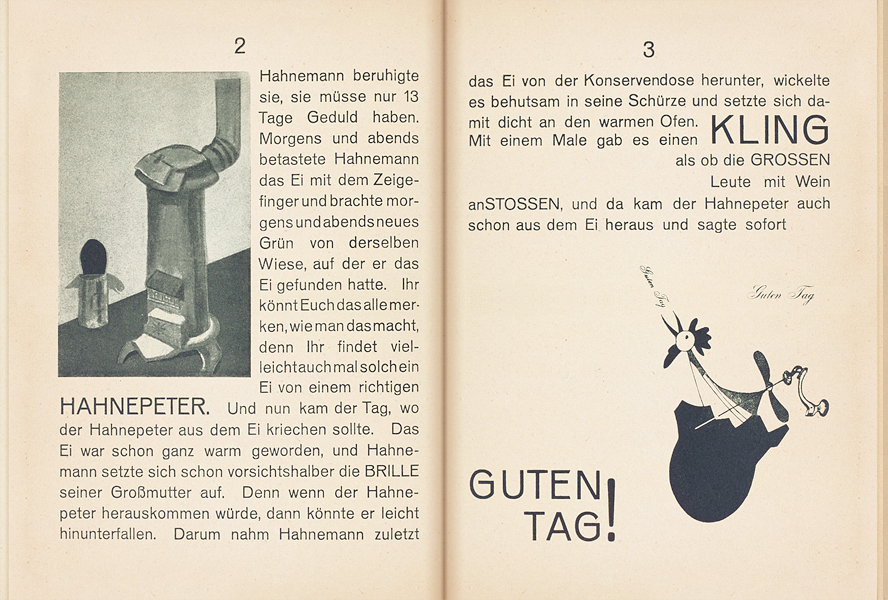
4/25 Push an image to enlarge
(♪) Hahnemann put the egg in a can, and in the morning and in the evening, he touched the egg with his forefinger. He made a nest of fresh grass from the meadow where he found the egg. Soon, the day arrived when the Hahnepeter would hatch from its shell. The egg was very warm now.
(♪) On that day Hahnemann took the egg from the can and wrapped it gently in his apron as he sat beside the warm stove. Suddenly, it cracked. It sounded almost like the tinkling of wine glasses heard when grownups make a toast. Then out of the egg came Hahnepeter. “Good day!”
(♪) On that day Hahnemann took the egg from the can and wrapped it gently in his apron as he sat beside the warm stove. Suddenly, it cracked. It sounded almost like the tinkling of wine glasses heard when grownups make a toast. Then out of the egg came Hahnepeter. “Good day!”
Stories of Paradise
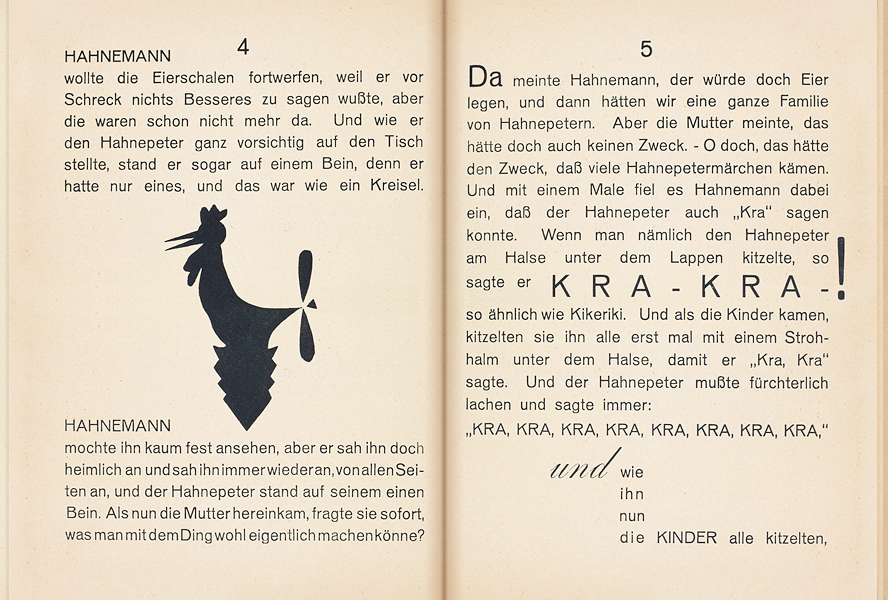
5/25 Push an image to enlarge
(♪) Speechless with surprise, Hahnemann thought he should throw away the shell, but he could not find the shell anywhere. He carefully tried to put Hahnepeter on the table, but it was already standing on one leg. In fact, Hahnepeter had only one leg, making it look like a top. Hahnemann did not want to look closely at the Hahnepeter but he quietly did. He looked again and again from every side. Hahnepeter was standing on one leg. Mother came in and asked what would he do with such a thing.
(♪) “It will lay eggs again,” answered Hahnemann, “and there will be a big family of Hahnepeters.” His mother said it was nonsense. Then suddenly Hahnemann noticed that Hahnepeter could cry “Kra!” When tickled in the neck under its beak, the bird crowed, “Kra, Kra!” All the children came around and each of them tickled it under its throat with a straw and made it crow, “Kra, Kra! The Hahnepeter cried out over and over, “Kra, Kra, Kra, Kra Kra, Kra, Kra . . . .”
(♪) “It will lay eggs again,” answered Hahnemann, “and there will be a big family of Hahnepeters.” His mother said it was nonsense. Then suddenly Hahnemann noticed that Hahnepeter could cry “Kra!” When tickled in the neck under its beak, the bird crowed, “Kra, Kra!” All the children came around and each of them tickled it under its throat with a straw and made it crow, “Kra, Kra! The Hahnepeter cried out over and over, “Kra, Kra, Kra, Kra Kra, Kra, Kra . . . .”
Stories of Paradise
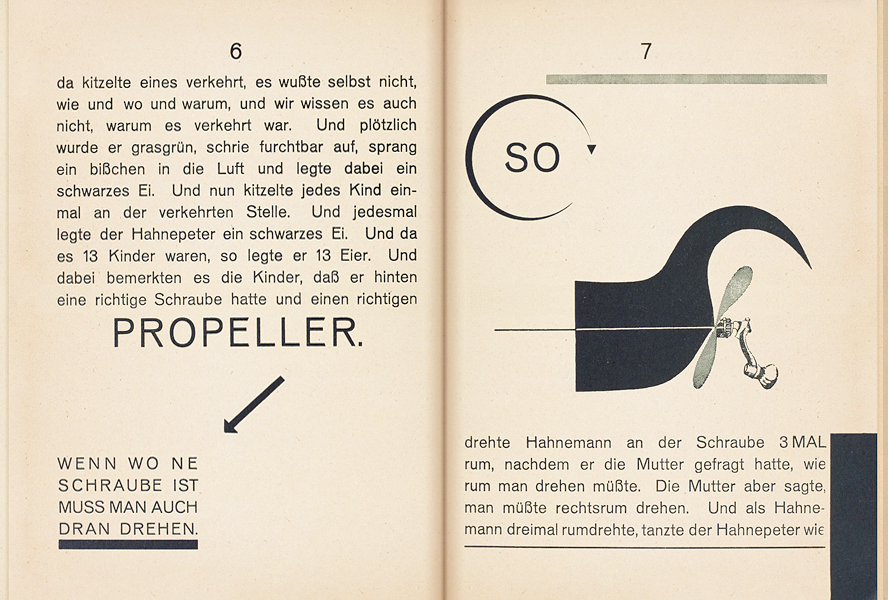
6/25 Push an image to enlarge
(♪) Then one child tickled the back side of its neck. Suddenly, Hahnepeter turned green and uttered a shriek. It made a leap into the air and laid a black egg. The other children tickled it on the back of its neck. As there were thirteen children, it laid thirteen eggs. Then, the children noticed that Hahnepeter had a real screw on its rump, with a real propeller.
(♪) Hahnemann asked his mother how to wind it. His mother told him to turn the screw to the right. When Hahnemann turned the screw three times, the Hahnepeter did a dance, with steps from classic ballet.
(♪) Hahnemann asked his mother how to wind it. His mother told him to turn the screw to the right. When Hahnemann turned the screw three times, the Hahnepeter did a dance, with steps from classic ballet.
Stories of Paradise
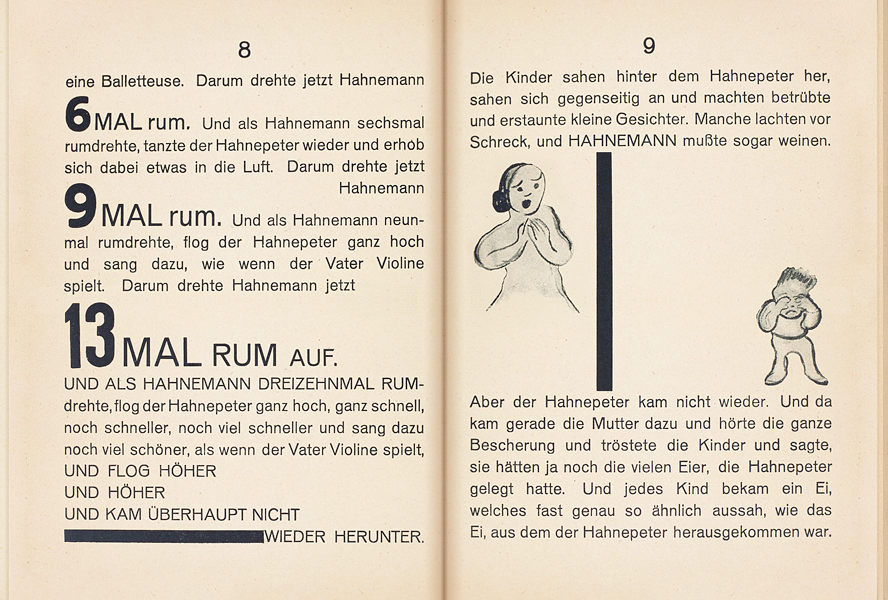
7/25 Push an image to enlarge
(♪) Now Hahnemann turned round and round six times. When Hahnemann turned around six times Hahnepeter danced also, flying up in the air. Hahnemann turned around nine times and Hahnepeter jumped up very high and started to sing like Hahnemann’s father playing the violin. When Hahnemann turned around thirteen times, Hahnepeter jumped up high and quickly, then faster and farther, and he sang more beautifully than father’s violin. And it flew higher and higher, until it did not come down to earth again.
(♪) The children who had seen Hahnepeter leaping into the air looked at each other in surprise and with sadness. Some were so surprised that they laughed. Hahnemann could not help crying. But the Hahnepeter never came back. Mother came along and heard what had happened. She consoled the children, telling them they still had all those eggs that the Hahnepeter had laid. She gave one egg to each child. They were almost the same as the egg from which Hahnepeter was hatched.
(♪) The children who had seen Hahnepeter leaping into the air looked at each other in surprise and with sadness. Some were so surprised that they laughed. Hahnemann could not help crying. But the Hahnepeter never came back. Mother came along and heard what had happened. She consoled the children, telling them they still had all those eggs that the Hahnepeter had laid. She gave one egg to each child. They were almost the same as the egg from which Hahnepeter was hatched.
Stories of Paradise
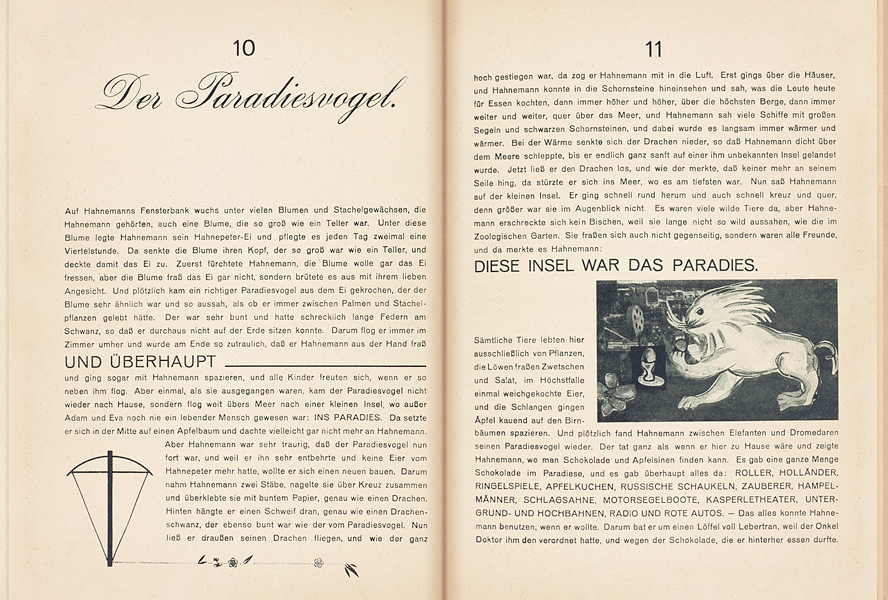
8/25 Push an image to enlarge
(♪) The Bird of Paradise. When Hahnemann hatched the egg the Hahnepeter had laid, a Bird of Paradise was born. It looked like a flower and had such a long tail that it could not sit on the ground and had to keep flying. The Bird of Paradise ate from Hahnemann’s hand and flew with him when he went on walks. But one day, the Bird of Paradise flew away to a little island. The island was a Paradise without any human beings except Adam and Eve. There the Bird of Paradise sat on an apple tree and totally forgot about Hahnemann. Hahnemann was very sad, so he made a kite, with a tail that looked like the tail of the Bird of Paradise, and hanging tight to the kite, he rose up into the air.
(♪) Hahnemann rose up and up over the mountains, across the ocean, and arrived at an unknown island. There were many animals, not eating each other but all friends. Hahnemann saw that the island was Paradise. Suddenly, Hahnemann saw the Bird of Paradise flying between the one-hump camel and an elephant. The Bird of Paradise acted quite at home; it told Hahnemann where he could find chocolates. There was not only food, but also swings, a witch, a radio, a subway, highways, a red automobile, etc., etc, without end.
(♪) Hahnemann rose up and up over the mountains, across the ocean, and arrived at an unknown island. There were many animals, not eating each other but all friends. Hahnemann saw that the island was Paradise. Suddenly, Hahnemann saw the Bird of Paradise flying between the one-hump camel and an elephant. The Bird of Paradise acted quite at home; it told Hahnemann where he could find chocolates. There was not only food, but also swings, a witch, a radio, a subway, highways, a red automobile, etc., etc, without end.
Stories of Paradise
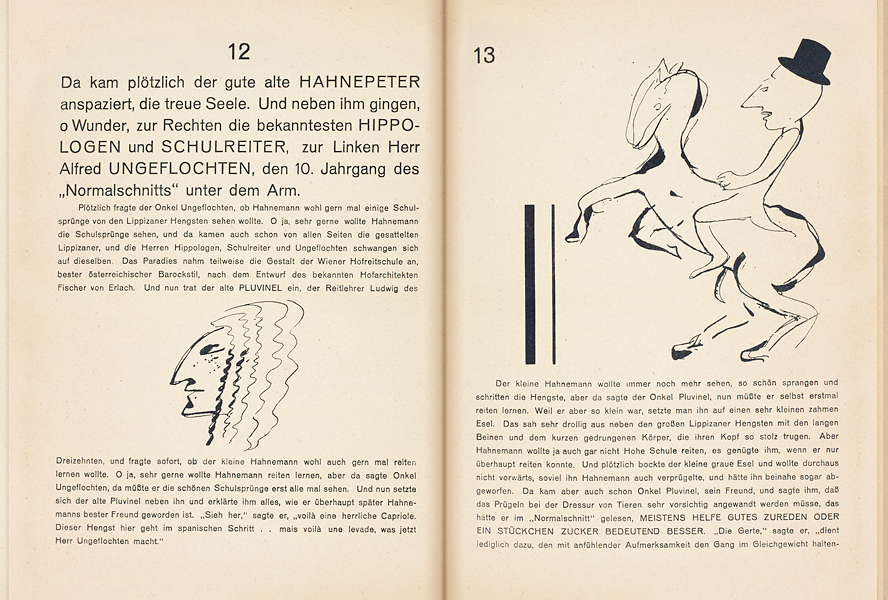
9/25 Push an image to enlarge
(♪) Then suddenly, his dear old Hahnepeter came flying toward him! And beside it on the right were the famous horse therapist Hippologen and the horse trainer Schulreiter, and on its left was the man with the disheveled hair Ungeflochten! Ungeflochten asked if Hahnemann wanted to see the training of the horses. Of course! Then, the saddled horses came running and Hippologen and Schulreiter jumped on them. Paradise now looked just like the royal Riding School of Vienna. Then, the riding coach came along and asked Hahnemann if he would learn horse riding. Of course Hahnemann said, “Yes.”
(♪) Hahnemann rode on a small donkey. He looked rather awkward beside the coach riding elegantly on a magnificent horse, but Hahnemann was happy just to be able to ride. However, when Hahnemann tried to make the donkey go forward, it suddenly reared up. When he used his whip, the donkey tried to shake him off. Then, the trainer instructed him not to use the whip when training animals but instead to talk gently or give the animal a piece of sugar.
(♪) Hahnemann rode on a small donkey. He looked rather awkward beside the coach riding elegantly on a magnificent horse, but Hahnemann was happy just to be able to ride. However, when Hahnemann tried to make the donkey go forward, it suddenly reared up. When he used his whip, the donkey tried to shake him off. Then, the trainer instructed him not to use the whip when training animals but instead to talk gently or give the animal a piece of sugar.
Stories of Paradise
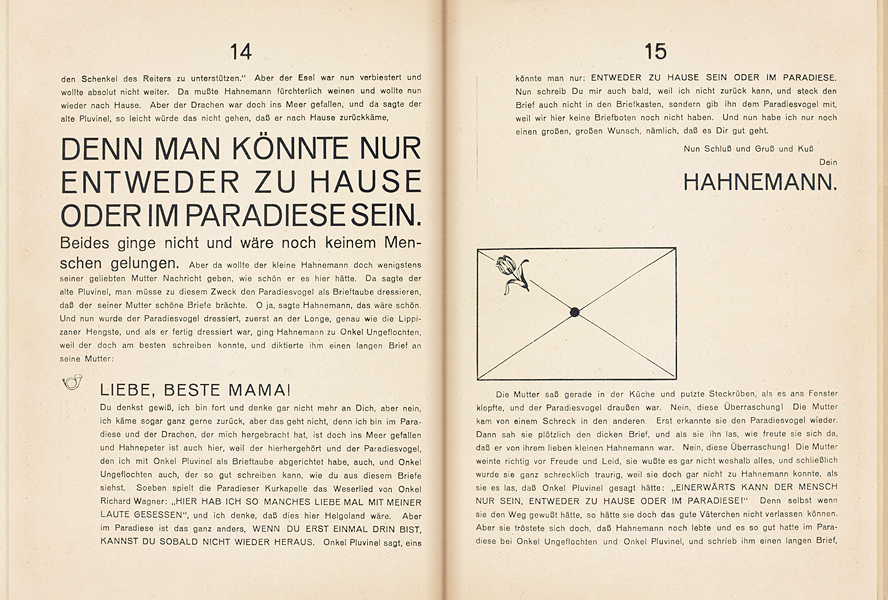
10/25 Push an image to enlarge
(♪) The donkey, however, became uncontrollable, and Hahnemann cried bitterly, saying he wanted to go home. He was told that he could not go home so easily. Hahnemann asked Ungeflochten, who was good at writing, to write a long letter to his mother. “Dear Mother, After I left home, you might think I forgot you. I want to go home, but I cannot go home as I am now on the Island of Paradise and the kite that brought me here dropped into the ocean. Hahnepeter is here. This is where he originally came from. The Bird of Paradise is here also. And we will make it into a courier bird. Ungeflochten is also here. He is the one who is writing this letter for me.
(♪) Once one comes here it is not easy to go home. We must decide if we want to stay at home or stay in Paradise. Mother, please write to me because I cannot go home. Please give the Bird of Paradise your message. From Mama’s boy, Hahnemann” Mother was working in the kitchen when the Bird of Paradise knocked on the window. Mother cried and rejoiced, but then she became very sad. She wanted to go to Paradise, but she could not leave Hahnemann’s father alone. Still, Mother was happy to know that Hahnemann was alive and living together with the friendly riding coach and Ungeflochten with the disheveled hair in Paradise. So she wrote a long letter.
(♪) Once one comes here it is not easy to go home. We must decide if we want to stay at home or stay in Paradise. Mother, please write to me because I cannot go home. Please give the Bird of Paradise your message. From Mama’s boy, Hahnemann” Mother was working in the kitchen when the Bird of Paradise knocked on the window. Mother cried and rejoiced, but then she became very sad. She wanted to go to Paradise, but she could not leave Hahnemann’s father alone. Still, Mother was happy to know that Hahnemann was alive and living together with the friendly riding coach and Ungeflochten with the disheveled hair in Paradise. So she wrote a long letter.
Stories of Paradise

11/25 Push an image to enlarge
(♪) In her letter to Hahnemann, Mother said he should wash his hands before dinner, wear an overcoat and boots in bad weather, etc. etc. . . .The Bird of Paradise flew back and forth every eight days, carrying the letters. During those days Hahnemann learned how to ride.
(♪) Paradise in the Pasture. When they heard about the Hahnemann letter, all the children wanted to go to Paradise. They asked his mother how he got to Paradise. When the children heard that those who hatched the Bird of Paradise from the egg of a Hahnepeter had to die, they became very sad and took the eggs back home. One day, a boy called Ernst began to think he could get to Paradise without the Bird of Paradise, as it should not be so far away. He was very eager to go there. All his friends wanted to go with him but he decided to go only with his mother and his dear girlfriend Else, who was wearing a lot of ribbons.
(♪) Paradise in the Pasture. When they heard about the Hahnemann letter, all the children wanted to go to Paradise. They asked his mother how he got to Paradise. When the children heard that those who hatched the Bird of Paradise from the egg of a Hahnepeter had to die, they became very sad and took the eggs back home. One day, a boy called Ernst began to think he could get to Paradise without the Bird of Paradise, as it should not be so far away. He was very eager to go there. All his friends wanted to go with him but he decided to go only with his mother and his dear girlfriend Else, who was wearing a lot of ribbons.
Stories of Paradise

12/25 Push an image to enlarge
(♪) Ernst declared that Paradise should be very close. He walked down the road near the house. At the fence to a pasture, he declared, “This is the gate to Paradise!” His mother said, “No, this is the entrance to the cow pasture.”
“But it only looks like it. We are already in the middle of Paradise. Look at the sky! It’s gold! ” So said Ernst. When Else said she stepped in the cow’s dung, Ernst said it was Paradise honey pudding. When a cow came along, he said it was a horse for riding. When they saw a farmer coming toward them, Ernst said that must be the man of Paradise about whom Hahnemann wrote in his letter.
“But it only looks like it. We are already in the middle of Paradise. Look at the sky! It’s gold! ” So said Ernst. When Else said she stepped in the cow’s dung, Ernst said it was Paradise honey pudding. When a cow came along, he said it was a horse for riding. When they saw a farmer coming toward them, Ernst said that must be the man of Paradise about whom Hahnemann wrote in his letter.
Stories of Paradise

13/25 Push an image to enlarge
(♪) Mother said it was a farmer coming toward them and there was no telling what he would do to them. But Ernst would not hear of it, saying it was the horse trainer. In the meantime Mother also stepped in the cow’s dung and declared that it was definitely not Paradise. But Ernst did not give in. Else also said the stick the man was carrying was a whip to herd the cows, not a training whip.
(♪) One cow, seeing Ernst coming close, suddenly raised its tail high, lowered its head, and dashed towards him, pointing her horns at him just as in a Spanish bullfight. Ernst panicked and ran with all his might until he got outside of the farm fence. Then he shouted back at the cow. “We were only pretending it was Paradise! I know you are not a horse for riding!”
(♪) One cow, seeing Ernst coming close, suddenly raised its tail high, lowered its head, and dashed towards him, pointing her horns at him just as in a Spanish bullfight. Ernst panicked and ran with all his might until he got outside of the farm fence. Then he shouted back at the cow. “We were only pretending it was Paradise! I know you are not a horse for riding!”
Stories of Paradise
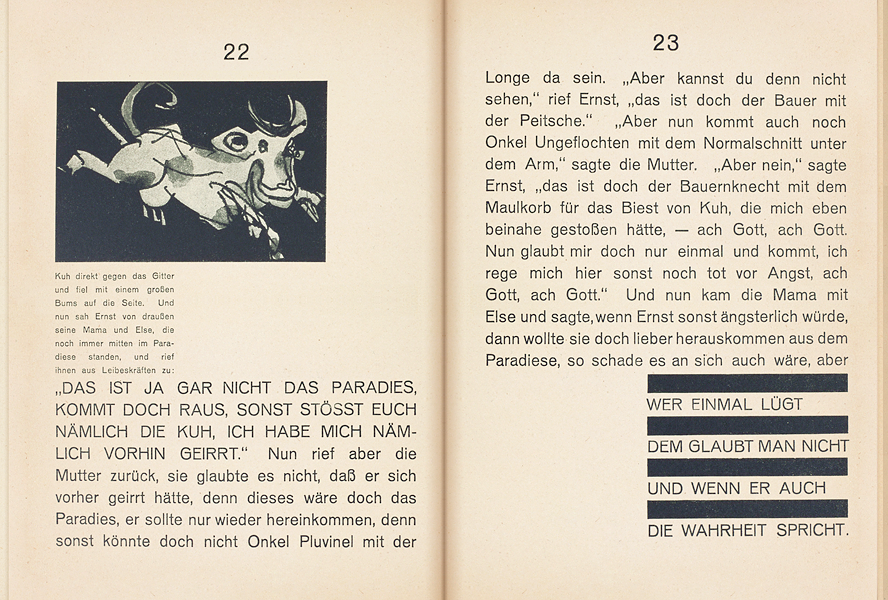
14/25 Push an image to enlarge
(♪) As the furious cow rushed towards him, Ernst took a quick turn, and the cow crashed to the fence and fell. Then Ernst noticed that his mother and Else were still in the pasture and shouted desperately from outside. “It isn’t really Paradise. I made a mistake! Hurry, hurry and get out!” Then his mother shouted back from the farm, “No, this is Paradise! You did not make a mistake! Look, there is the trainer with his training whip. Hurry, hurry, you should come back in.”
(♪)“Mother, can’t you see him? He is a farmer. He is holding a whip.” “Look, though, even Uncle Ungeflochten is coming!” “No, he is just a helper. He has come to put reins on the cow that dashed at me! Oh no! It’s dangerous! Please believe me and come out. I am worried to death! Hearing him say that, Mother and Else finally came out. They said they were sorry to come out of Paradise but did it because he was so worried. She added, “Once you lie, people may not believe you even when you try to tell the truth.”
(♪)“Mother, can’t you see him? He is a farmer. He is holding a whip.” “Look, though, even Uncle Ungeflochten is coming!” “No, he is just a helper. He has come to put reins on the cow that dashed at me! Oh no! It’s dangerous! Please believe me and come out. I am worried to death! Hearing him say that, Mother and Else finally came out. They said they were sorry to come out of Paradise but did it because he was so worried. She added, “Once you lie, people may not believe you even when you try to tell the truth.”
Stories of Paradise
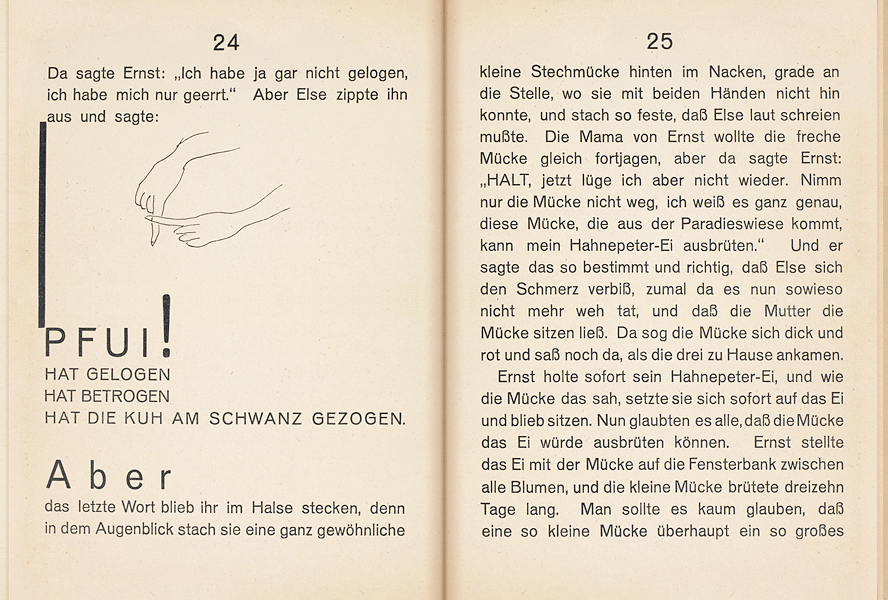
15/25 Push an image to enlarge
(♪) Ernst said, “I didn’t lie. I just made a mistake!” Else was very angry and annoyed. “You lied! You deceived us! You pulled the cow’s tail!” Then at that moment, a mosquito came by and stung Else on the nape of her neck.
(♪) Mother was about to smash the mosquito, but Ernst said, “Wait! I won’t lie again. But, I can tell that this mosquito came from Paradise. It might be able to hatch a Hahnepeter egg. Ernst spoke with such confidence that Else forgot her aching and the three went home quietly with the mosquito hanging on the nape of Else’s neck. When Ernst brought out the Hahnepeter egg, the mosquito was quickly attracted to it. Ernst put the egg on the windowsill.
(♪) Mother was about to smash the mosquito, but Ernst said, “Wait! I won’t lie again. But, I can tell that this mosquito came from Paradise. It might be able to hatch a Hahnepeter egg. Ernst spoke with such confidence that Else forgot her aching and the three went home quietly with the mosquito hanging on the nape of Else’s neck. When Ernst brought out the Hahnepeter egg, the mosquito was quickly attracted to it. Ernst put the egg on the windowsill.
Stories of Paradise
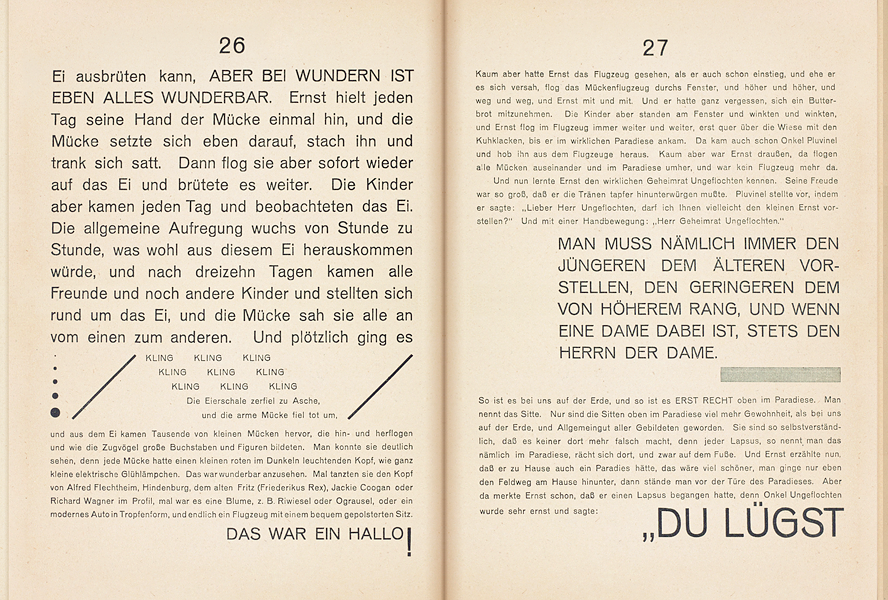
16/25 Push an image to enlarge
(♪) For thirteen days, Ernst held out his hand to the mosquito. It drew blood from Ernst and then went back to hatching the egg. All the children came to see, and one day the egg made a cracking noise. The shell cracked and the mosquito died. Out of the egg came countless mosquitoes. Each had a shining red head like a light bulb. They flew around, grouping into the shapes of letters and faces, and finally they formed an airplane.
(♪) Ernst got into the plane and immediately it flew out of the window. As the children waved their hands, it flew over the dairy farm fence and towards the real Paradise. When Ernst arrived in Paradise, he was taken out of the airplane by the horse trainer. As soon as Ernst had gotten out, the airplane fell apart and the mosquitoes scattered. Ernst was introduced to everyone and then, he started to tell them about the Paradise around his home. Going down the road nearby, he said, there was an entrance to Paradise . . . But then, Ungeflochten’s expression became fearsome and he roared, “You are lying!”
(♪) Ernst got into the plane and immediately it flew out of the window. As the children waved their hands, it flew over the dairy farm fence and towards the real Paradise. When Ernst arrived in Paradise, he was taken out of the airplane by the horse trainer. As soon as Ernst had gotten out, the airplane fell apart and the mosquitoes scattered. Ernst was introduced to everyone and then, he started to tell them about the Paradise around his home. Going down the road nearby, he said, there was an entrance to Paradise . . . But then, Ungeflochten’s expression became fearsome and he roared, “You are lying!”
Stories of Paradise
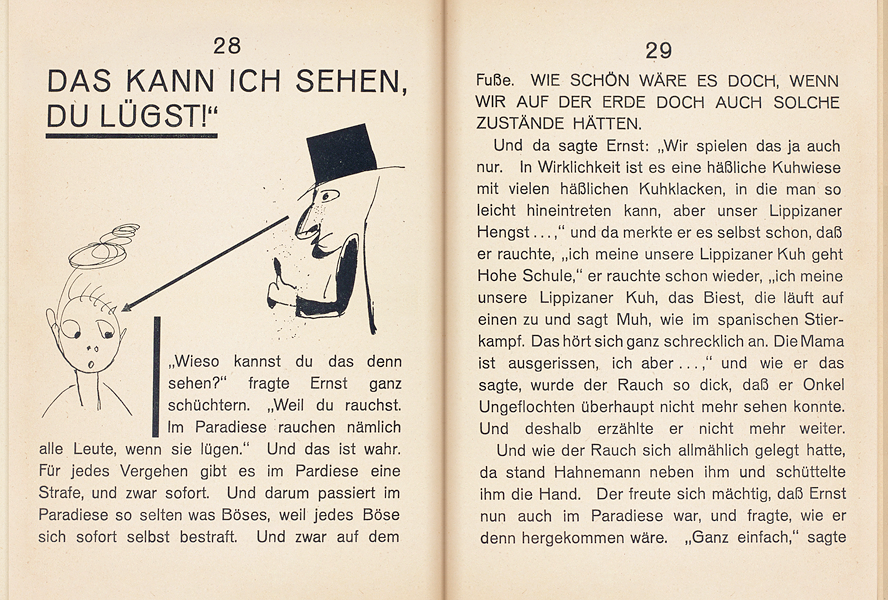
17/25 Push an image to enlarge
(♪) “I can tell, I can see that you are lying!” “How can you see?” asked Ernst timidly. “If you lie in Paradise, smoke comes out of you.” In Paradise, you see, people who do bad things have to punish themselves. That was why there is little evil found in Paradise.
(♪) “I was just joking. Actually it was just a dirty farm. There were horses for riding . . .” and Ernst noticed that smoke began to come out of him. “No, it was a cow going to school,” again, out came the smoke. It was such a thick smoke that he couldn’t see Ungeflochten. When the smoke had somewhat dispersed, Hahnemann came out and shook hands with Ernst. He was very happy to see him and asked how he had come.
(♪) “I was just joking. Actually it was just a dirty farm. There were horses for riding . . .” and Ernst noticed that smoke began to come out of him. “No, it was a cow going to school,” again, out came the smoke. It was such a thick smoke that he couldn’t see Ungeflochten. When the smoke had somewhat dispersed, Hahnemann came out and shook hands with Ernst. He was very happy to see him and asked how he had come.
Stories of Paradise
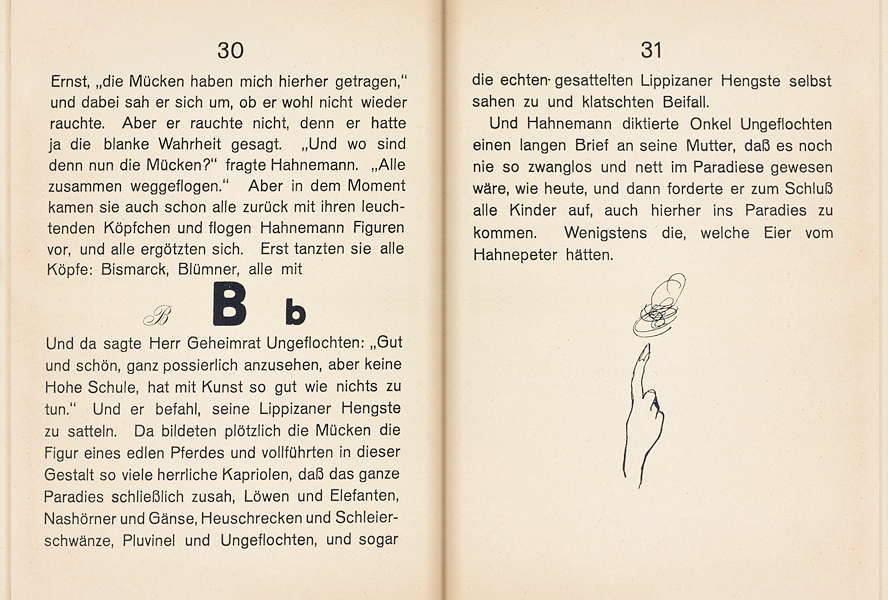
18/25 Push an image to enlarge
(♪) “It was easy. The mosquitoes brought me here.” Ernst looked around but there was no smoke, for it was true. Then all the mosquitoes came back and shaped a man’s face starting with a B as in Bismark. They formed into many shapes.
(♪) Hahnemann wrote a long letter to his mother. “There never was a time so pleasant as this. Tell all the children to come here. Especially, the ones who have the Hahnepeter egg should come to visit Paradise.”
(♪) Hahnemann wrote a long letter to his mother. “There never was a time so pleasant as this. Tell all the children to come here. Especially, the ones who have the Hahnepeter egg should come to visit Paradise.”
No narration on page 19
Stories of Paradise

19/25 Push an image to enlarge
No narration on page 20
Stories of Paradise
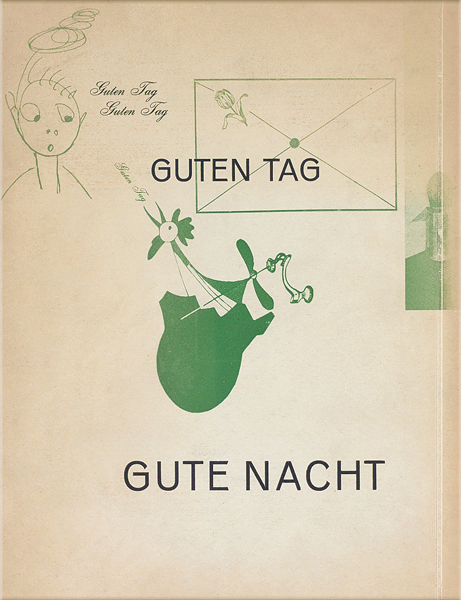
20/25 Push an image to enlarge
No narration on page 21
About the author 1/4
By Kurt Schwitters (1887–1948)
and Kate Steinitz (1889–1975)\
1)
Kurt Schwitters was born in Hannover, Germany in 1887. After attending Hannover Academy of Art and Craft, he studied at the art academies in Dresden and Berlin from 1909 to 1914. During World War I, after finishing military service at Hannover, he worked as a mechanical draftsman at an ironworks until the end of the war and later studied architecture in Hannover in 1920.
21/25
No narration on page 22
About the author 2/4
2)
Schwitters’ work was based on Expressionist and Cubist concepts, but in 1918, declaring that all values are interrelated, he asserted that it was narrow-minded and one-dimensional to impose restrictions on the materials of art. He later invented his own aesthetic, which he called “Merz,” based on the idea of the assembling of artistic material of every description (the word Merz came from his first collage, titled “Kommerbank”). His first exhibition took place in 1918. He began writing around 1919 and founded the publishing house Apossverlag Hannover to bring out his own children’s literature including the collection “Stories of Paradise.” In 1920 he is said to have undertaken his first Merz building and in 1921 produced his acoustic poem “Ursonate.”
22/25
No narration on page 23
About the author 3/4
3)
Although Schwitters had been rejected by the Berlin Dadaists because of his unwillingness to involve politics in his art, he is often seen as part of the Dadaists because of his close relationship with Hans Arp, Theo van Doesburg, Tristan Tzara and others in the movement.From around 1930, Kurt Schwitters began traveling to Norway and finally emigrated there in 1937. His three-dimensional art was denounced as decadent by the Nazis and his literary works were burned. When German troops invaded Norway he fled with his son to England where, until his death, he earned a living by portrait and landscape painting.
23/25
No narration on page 24
About the author 4/4
4)
Involving every subject no matter whether familiar or unfamiliar, his purpose was to tell children a story via the medium of Merz. Schwitters appeared to believe that young people were sure to understand stories and artwork filled with every possible element. “Stories of Paradise” is a valuable work reflecting the creative convictions of an artist of the Modernist era.
24/25
Contents
25/25
